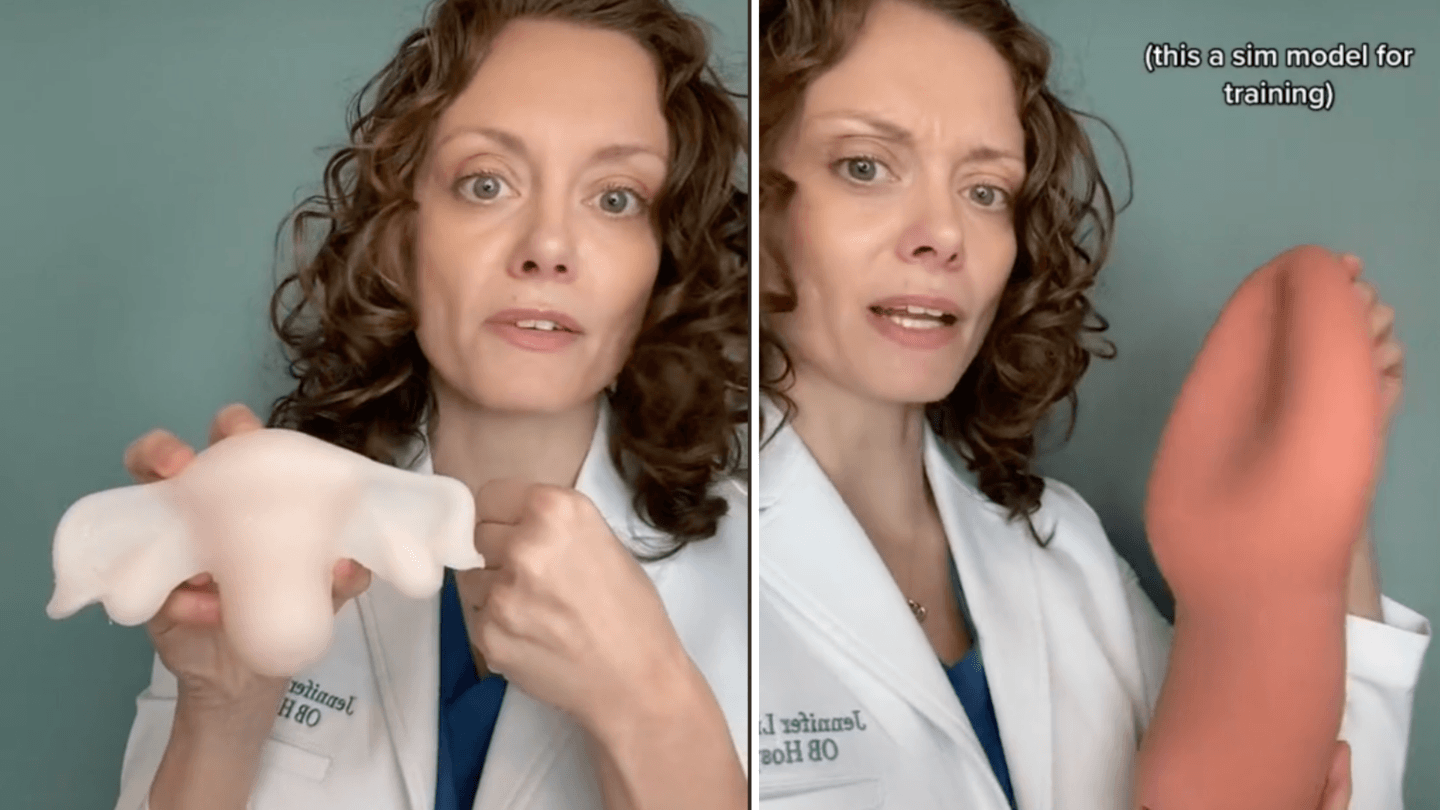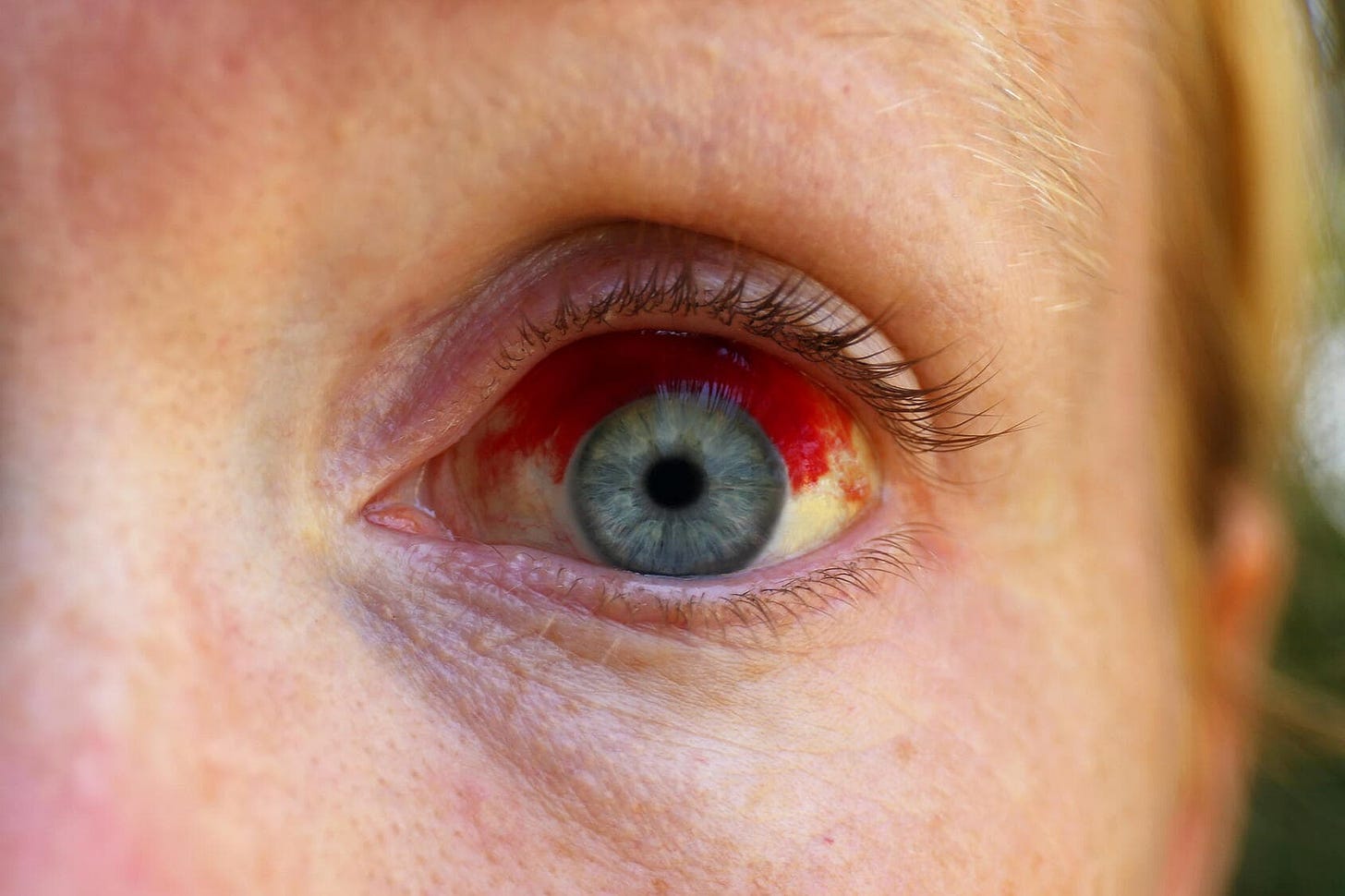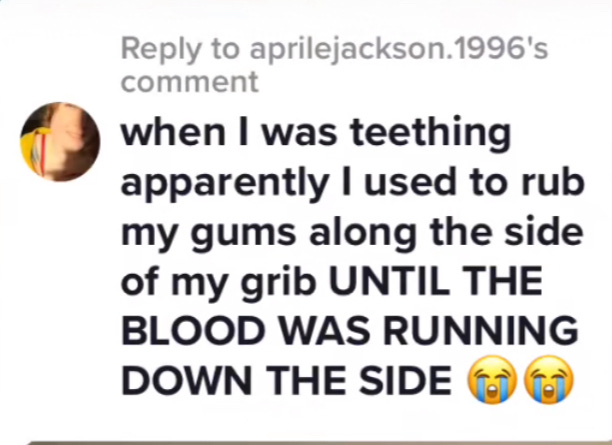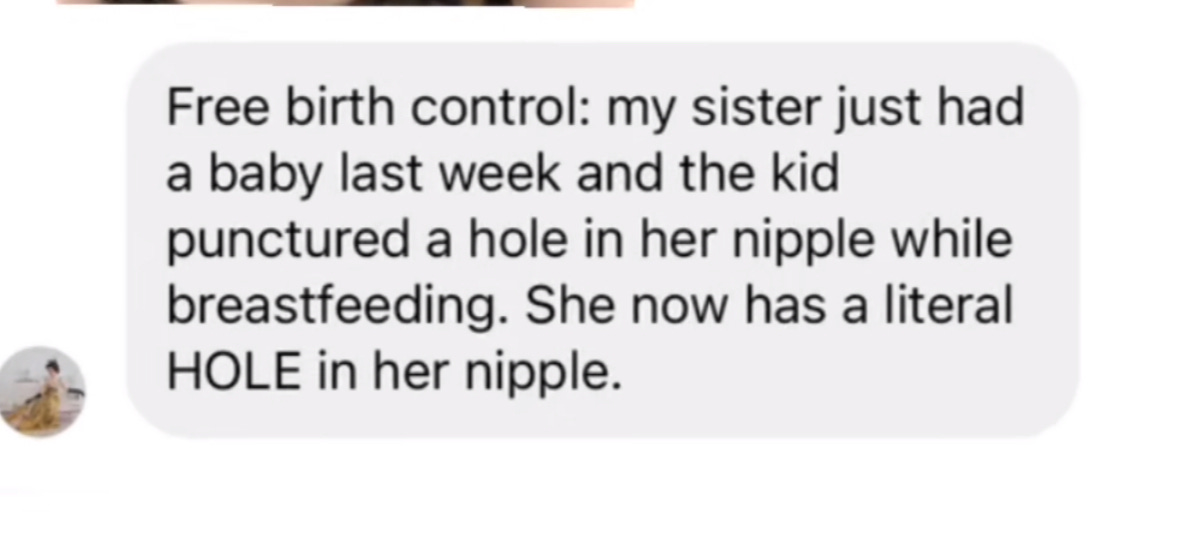"The List"
100+ Reasons Not to Have Kids
100+ Reasons Not To Have Kids
Part 1: Pregnancy
Morning sickness.
This girl threw up so much from morning sickness she popped the blood vessels in her eyes. It looks like this:
You can become allergic to your own skin. It’s called pemphigoid gestationis and it effects about 1 in 50,000 pregnancies.
You can’t choose how many babies you have. Imagine you finally decide you’re ready to have a kid and then BOOM, triplets. That’s triple the finances, triple the mouths to feed, and triple the stress!
MANY women lose their teeth during and after pregnancy. Babies need a lot of calcium to grow their skeletons, and if there isn’t enough calcium in the woman’s diet, the baby will take the calcium from the mother’s bones. They literally steal your bones to make their own.
Babies sometimes grind their gums together in the womb and you can HEAR THEM doing it
Fetuses in the womb will grow hair called lanugo all over their bodies in order to help keep them warm. Eventually the fetus will shed that hair and eat it. For the first few days of their life, a babies poop is made out of mostly hair and amniotic fluid. ew.
This heavily tattooed woman grew warts and blisters all over her body because her pregnant body started to reject the years-old ink from her tattoos.
Babies kicking and moving around in the womb isn’t always “cute.” Sometimes it looks like an alien is trying to brutally claw their way out of the body. And apparently it HURTS.
You can become allergic to the baby’s pee when it’s inside you which makes your insides feel “itchy”
One woman said the baby felt like a “bag of snakes” inside her
You can grow pregnancy tumors in your mouth called pryogenic granulomas
Your toenails can get really soft and break or even fall completely off
Strange cravings- this woman became addicted to the spongey cushions in her armchair.
Hormonals changes can impact the melanin production in your hair and cause it to turn white prematurely
It’s very common for the 2 muscles that run down the middle of your stomach to separate during pregnancy. It’s called diastasis recti and your can put your fingers into the separation, which looks like this:
You can develop an allergy to your pets while pregnant. This one is an absolute deal breaker for me, my 2 cats are my babies.
Your voice can change. Swelling in the vocal chords, pressure on the diaphragm, and hormonal changes can make your voice get deeper while pregnant. Kristen Bell apparently had to rerecord a bunch of her lines in the movie “Frozen” after she gave birth because the change was so noticeable.
"Dermoid cyst" - a type of ovarian tumor that can contain mature tissues like hair, teeth, and even skin, essentially forming a "mini body" within the ovary. They can contain teeth, hair, and even eyeballs
When babies “kick,” they can actually bruise you from the inside.
Pregnancy nose.
It’s possible to become so constipated during pregnancy that the poop has to come out the other end. Pregnant people have literally puked their own sh*t.
One mom developed asthma from her baby kicking her lungs so often inside her
Chromhidrosis is a rare condition commonly associated with pregnancy where your sweat can turn colors. This can dye your clothing, your bed sheets, and even your toilet seat blue, green, yellow, brown, or even black.
Preeclampsia and all of it’s symptoms (Headaches that don't go away, nausea, vomiting, dizziness, pain, sudden weight gain, trouble breathing, edemas, and more)
Stone Babies. Calcified fetuses that, if undetected, can stay in your body for your entire life. This woman was “pregnant” with a stone baby for over 40 years.
Baby kicks feel like diarrhea at first
Your belly can stretch so far that your belly button completely disappears
“Morning” sickness is not limited to mornings.
You can get pregnant… while you’re pregnant. It’s called a “superfetation” pregnancy. One surrogate mother was pregnant with someone else’s baby and then got pregnant with her own baby 6 months later!
Blood volume during pregnancy increases by 45%. You have almost a gallon more blood in your body while pregnant.
Sometimes your baby turns into cancer??????? It’s called Gestational trophoblastic disease, a type of pregnancy-related cancer that occurs when a fertilized egg becomes a tumor instead of a fetus.
PUPPS or “Pruritic Urticarial Papules and Plaques of Pregnancy.” An Extremely itchy rash that covers pregnancy bellies around/after the third trimester. One woman on reddit said she it was so bad that for 9 weeks she couldn’t sleep and fantasized about to peeling her own skin off.
Your brain literally shrinks during pregnancy. What was commonly known as “mommy brain” has been recently proven to be very real. The parts of your brain responsible for memory, word recall, and executive function shrink. And the worst part? it never returns to normal.
Cats can tell when you’re pregnant because you start to smell different. Some cats might adapt well to this change, but some cats attempt to cover up this new smell with their own. This means they might start peeing ON and around you. On your bed, your pillow, your couch, your laundry… etc. That’s extra laundry for you to take care of as well as your house now smelling like a cat keeps peeing in places it shouldn’t. Lovely.
This woman’s baby was kicking her so hard from INSIDE her womb that she got bruises on the OUTSIDE.
On the subject of kicking, I got this comment on my video response to the last reason:
Part 2: Childbirth
The longest recorded labor in history was 75 DAYS LONG.
Most people poop on themselves and the delivery table during childbirth.
One woman in my TikTok comment section died twice during childbirth. She died. Twice.
Ekane (a popular TikToker and mother) said she has been shot 3 times and she prefers getting shot to contractions.
could get permeant stirrup scars from silicone
It’s possible to push so hard during contractions that you detach your retinas
It’s also possible for your entire eyeball to pop out during labor
The size of an average uterus before vs after giving birth (forget about “bouncing back, it’s literally impossible):
Episiotomies. They cut your vaginal hole opening with scissors to make it easier for the baby’s head to come through.
FORCEP. ASSISTED. DELIVERY. Also known as “The Salad Tongs”
Your bladder can be traumatized by the pressure of birth and it can cause your pee hole to swell shut. It can make peeing painful or, in extreme cases, impossible!
The blood vessels in your eyes can rupture if you push too hard during childbirth, resulting in something like this:
After you deliver the baby, you have to deliver the placenta. According to some, this feels like pushing a warm jellyfish the size of a handbag out of your vagina.
Cervical ripening balloons.
Your vagina can fall out. It can fall out during birth or it can fall out years down the line.
Your butthole can rip open during childbirth
your labia can fly off during childbirth
This woman was billed over $50,000 for her postpartum hospital stay
Human heads have evolved at an extremely rapid rate, which is why humans have a much higher childbirth mortality rate than other mammals. Baby heads are literally too big for our tiny bipedal pelvises!
When necessary, a nurse might shove their entire fist into your vagina to prevent you from hemorrhaging during childbirth
Epidurals. Many people are under the impression that epidurals are an anesthetic shot you get in your back once before labor happens. Epidurals are actually a small catheter and TUBE that stays in your back for your entire labor, continuously pumping you with anesthesia. Which brings me to the next bullet point…
The epidural needle.
Your epidural is also plugged into the wall, which means it can be unplugged. One woman on TikTok said her husband unplugged her epidural during labor in order to charge his phone, then called her dramatic when she said she was in pain.
One woman’s nurse tripped over her epidural while it was in her back. She has lifelong back pain now.
Another woman’s epidural caused her to lose the urge to pee for 6 months after birth. She peed herself constantly. Yeah… that’s enough about epidurals.
Part 3: Postpartum & the Newborn Phase
Postpartum stink. Apparently you stink BAD after childbirth. It’s been described to me as a sort of sweet rotting smell.
When babies get congested, they can’t blow their own noses. So you have to suck out their snot through a special straw and try your best not to accidentally swallow it. It’s disgusting.
Speaking of sucking things out… let’s talk mastitis. Mastitis is an inflammation or infection of breast tissue that can cause pain, redness, swelling, and warmth. It can also cause flu-like symptoms such as fever, chills, body aches, and headache. One woman had a strawberry-sized mastitis clot that her husband sucked out of her boob for her. How kind of him…
Tantrums.
Sometimes babies bite too hard when breastfeeding and turn your breastmilk pink with blood. And then they drink it. Like tiny little vampires. Renesmee would love it.
You have to be the one to clean up their throw up. And they are going to throw up… a lot.
If you have emetophobia… just forget about it.
Say goodbye to your bladder functionality. Many people who have given birth have to wear diapers for weeks and years, and some are unable to hold their pee when they sneeze or laugh for the REST OF THEIR LIVES.
Milk doesn’t just come from your breasts while breastfeeding. It can come out of your armpits too
There’s a formula shortage which makes formula extremely hard to find and EXTREMELY expensive.
Bilateral De Quervain Tenosynovitis, also nicknamed “Mommy’s Wrist.” A condition that causes painful swelling of your thumb and wrist caused by repetitive motions such as PICKING UP YOUR BABY. Picking up your baby over and over again for years can literally cause you to permanently lose functions in your hand!!
Say goodbye to sleeping regularly for the rest of your life
Babies can occasionally be born without the instinct to eat, which means they get hungry and cry for hours on end but still won’t eat.
Blowouts. Any time, anywhere.
Breastfeeding mothers leak when they hear babies cry in public. And it’s not just a few drops. This video shows just how much milk can start pouring out.
You probably won’t be able to fit in your old clothes anymore, which means you have to replace all your entire closet which is EXPENSIVE.
Female babies can sometimes be born with milk inside their boobs, and you have to milk them. Sometimes they have periods too.
This TikTok comment:
Babies can be born with teeth. It’s as terrifying as it sounds. And don’t even think about the implications of breastfeeding a baby with teeth…
Postpartum hair loss.
This TikTok comment:
Sometimes during tantrums, newborns can forget to breathe which can cause them to pass out.
Cradle cap.
D-MER or Dysphoric Milk Ejection Reflex. A condition that affects 5-9 percent of breastfeeding people that causes intense feelings of hopelessness, low self-esteem, anxiety, and guilt while breastfeeding. Little is known about what causes this condition. Current theories include drops in dopamine levels and hormonal shifts during breastfeeding.
Your baby could be growing another baby inside its head???? Fetus-in-fetu, sometimes called a parasitic twin, occurs when twins become conjoined in utero, but only one continues to develop.
Part 4: The Toddler Phase
Babies turn into TODDLERS. And then toddlers turn into teenagers. And teenagers turn into adults.
This Mom’s kid got superglue and mascara in her hair. The superglue was stuck in it for days and she lost a ton of her hair.
This kid used the carpeted stairs as toilet paper
Kids sometimes use their own poop as art supplies
One kid stole her mom’s Vaseline and used it to sooth her sore butthole after she used the bathroom. Her mom continued to use that Vaseline as CHAPSTICK. She’d been breaking out for weeks and had no idea why…
You have to fill your days with activities with for your kids. Say goodbye to your hobbies and free time, because your kids want to go to the park.
This woman’s child eats the plaster off her walls and she has to constantly replaster them
Kids are expensive. The hospital bills alone are too much to handle, not to mention it’s an extra mouth to feed for 18+ years, tuition payments, doctors appointments, an extra seat on a plane whenever you want to go somewhere, an extra room to rent, clothes to buy (which they’re constantly growing out of), etc.
One mom on TikTok had to replace her TV 3 times in 2 years
After years of carrying her heavy toddler, one woman needed a hip replacement because her toddler favored sitting on one side.
A human bite is the second most dangerous bite there is because of the unique bacteria in saliva. Toddlers like to bite things. In rare cases, without proper treatment, this can be fatal.
This kid peed in his mom’s conditioner bottle and she washed her hair with it. He also peed on the carpet and INSIDE the dishwasher. Imagine washing your dishes with pee instead of water…
Kids stuff (toys, clothes, dishware, necessities) ruins your aesthetic. Who remembers the sad beige mom incident?
Kids will turn the backseat of your car into a scientific anomaly with their snack crumbs and puke and sticky fingers.
Tantrums in the grocery store are embarrassing.
You can never poop in peace ever again. Your kids will always follow you into the bathroom, or need something from you right when you get comfortable, or make a huge mess while you’re taking care of business in the other room.
Children get REALLY mad when anyone other than themselves gets to blow out birthday candles. Once you have kids you have to decide between blowing out your own birthday candles or dealing with a tantrum.
You’ll find their toys EVERYWHERE. This mom was literally attacked by her son’s toy car. And someone in the comments added this:
One brave soul shared in my Instagram DMs that once when they were a kid they peed inside the heating vents (which are very difficult to clean) and therefore their entire house smelled like pee for years.
Overstimulation. Dealing with the “mommy? mommy? mommy?” of it all… no thanks.
Kids on flights. Keeping them entertained, quiet, fed, and calm for who knows how many hours?
This kid got a mouse trap stuck in his hair with a dead mouse STILL IN IT.
In a now deleted video, a mom from TikTok explained that her kids had a “vomit party” which is exactly what it sounds like. They intentionally chugged water and threw it up, for fun.
This kid made her mother deaf by accidentally kissing her ear with too much suction.
Day care can cost hundreds of thousands of dollars per year. Essentially, you have to be earning well above the average American income for day care to be worth it and affordable.
Children throw up everywhere. Including on your food. Hopefully you notice before you accidentally eat it unlike this mom.
This kid tried to serve her mom “tea”
Kids ALWAYS cut their own hair and end up looking insane for a few months
This mom’s kids used her makeup brushes to clean poop out of their shoes. And she didn’t notice. and then she USED THE BRUSHES.
This kid glued her mom’s roku remote to a table with nail glue.
This list will be updated regularly as I continue to make installments on my TikTok. Follow along there to stay up to date and check back here soon for more! Don’t forget to take your birth control!


















This list is legitimately more terrifying than any horror novel I’ve read
Don’t forget to research your birth control, too